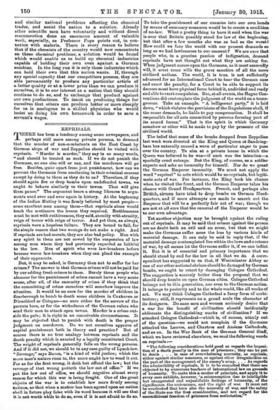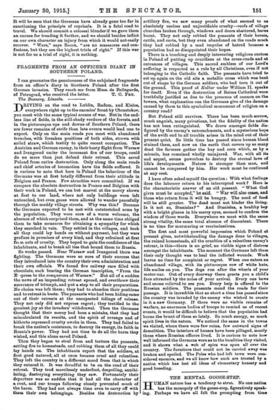REPRISALS.
grERE has been n a tendency among some newspapers, and perhaps still more among private persons, to demand that the murder of non-oomhatants on the East Collet by German ships of war and Zeppelins should be visited with reprisals. " Murder is murder," they say in so many words, and should be treated as such. If we do not punish the Germans, no one else will or can, and the murderers will go free. Besides, quite apart from just punishment, how can we prevent the Germane from continuing in their crimiruil courses except by doing to them as they do to us ? Therefore, if they should again fire or drop bombs upon undefended towns, we ought to behave similarly to their towns. That will give them pause." The argument bears a strong likeness to argu- ments used over and over again in history. At the beginning of the Indian Mutiny it was firmly believed by most people— some excellent men among them—that reprisals alone would teach the mutineers the lesson they required. Ruthlessness must be met with ruthlessness, they said, atrocity with atrocity, reign of terror with reign of terror. And yet then, as always, reprisals were a hopeless failure. They are bound to fail, for the simple reason that two wrongs do not make a right. And if reprisals are bad morals, they are also bad policy. Men with any spirit in them are not cowed by the suspension of law among men whom they had previously regarded as faithful to the law. Men of spirit who were law-breakers before become worse law-breakers when they can plead the example of their opponents.
But, it may he asked, is Germany then not to suffer for her crimes? The answer is that German crimes wlil not be paid for by our adding fresh crimes to them. Surely those people who clamour for the punishment of crime cannot have a very acute sense, after all, of the enormity of crime if they think that the committing of crime ourselves will somehow improve the situation. It would be no cure for the murder of children in Scarborough to bomb to death some children in Cuxhaven or Dusseldorf or Cologne—no care either for the sorrow of the parents hare, or for the wickedness of the German rulers who send their men to attack open towns. Murder is a crime out- side the pale ; it is right in no conceivable circumstance. It may be objected that to punish with death is the proper judgment on murderers. Do we not ourselves approve of capital punishment both in theory and practice P But of course there is no true analogy between reprisals and the death penalty which is exacted by a legally constituted Court. The weight of reprisals generally falls on the wrong persons. And if it did not, we should be in anycase guilty of Lynch law. "Revenge," says Bacon, "is a kind of wild justice; which the more man's nature rune to, the more ought law to weed it out. For as for the first wrong, it cloth but offend the law; but the revenge of that wrong putteth the law out of office." If we pat the law out of office, we should negative almost every reason for which this war ie being fought. One of the great objects of the war is to establish law more firmly among nations, so that when a matter has been agreed upon no nation shall in future play false with its word because it will see that it is not worth while to do so, even if it is not afraid to do so. To take the punishment of our enemies into our own hands by means of summary measures would be to create a condition of no-law. What a pretty thing to have it said when the war is over that Britain possibly stood for law at the beginning, but that after a few months she was as bad as the worst! How conld we face the world with our present demands so long as we had lawlessness to our account? We are sure that people who, in a genuine passion of indignation, demand reprisals have not thought out what they are asking for. When judgment comes upon the Germans, as it most assuredly will, it must come with the grave sanction of all the more civilized nations. The world, it is true, is not sufficiently advanced for an International Court to hear the German case and exact Use penalty, for a Court to be able to support its decrees must have physical force behind it, undivided and ready and able to exert compulsion. But, at all events, the Hague Con- ventions did contemplate the judgment of the world on a trims- greener. Take an example. " A belligerent party," it is laid down, " which violates the provisions of the Regulations shall, if the cause demands, be liable to pay compensation. It shall be responsible for all acts committed by persona forming part of its armed forces." That is the spirit in which Germany somehow or other will be made to pay by the pressure of the civilized world.
The belief that some of the bombs dropped from Zeppelins last week were directed at the King and Queen at Sandring- ham has naturally caused a wave of particular anger to pass over the country. To aim at a private house in which the Queen was believed to be was—if such was the intention—a specially cruel outrage. But the King, of course, as a soldier expects and asks no immunity for himself. Nor do we grant the German Emperor immunity. We must not apply the word "reprisal" to acts which would be no reprisals, but legiti. mate acts of war. For instance, the King took his chance when he visited the front, and the German Emperor takes his chance with Grand Headquarters. French, and perhaps also British, airmen have tried to drop bombs on German Iread.. quarters, and if more attempts are made to search out the Emperor that will be a perfectly fair act of war; though we are not at all sure that the removal of the Emperor would be to our own advantage.
Yet another objection may be brought against the ruling out of reprisals. It may be said that crimes against the person are no doubt both an evil and au error, bat that we might make the Germane suffer none the lees by various kinds of material damage. It can only be said in reply that, if the material damage contemplated lies within the laws and customs of war, by all means let the Germans suffer it, if we can inflict it. But it is of essential and primary importance that we should stand by and for the law in all that we do. A corre- spondent has suggested to ns that, if Westminster Abbey or one of our other national shrines should be damaged by German bombs, we ought to retort by damaging Cologne Cathedral. The suggestion is scarcely better than the proposal that we should drop bombs on open German cities. Cologne Cathedral belongs not to this generation, nor even to the German nation. It belongs to posterity and to the whole world, like all worksof art. We may think Cologne Cathedral a fussy form of archi- tecture; still, it represents on a grand scale the character of its designers. Do eane men and women seriously deaire that a war for the benefit of civilization should incidentally obliterate the distinguishing marks of civilization P If we attacked Cologne Cathedral—which is, of course, utterly out of the question—we could not complain if the Germans attacked the Louvre, and Chartres and Amiens Cathedrals, and so on. In the War Book of the German General Staff, which we have reviewed elsewhere, we read the following words on reprisals "The following conrideratione hold good as regards the imposi- tion of a death penalty in the ease of prisoners ; they UM be put to death . . . in ease of overwhelming necessity, as reprisals, either against similar measures, or against other irregularitioa on the part of the management of the enemy's army. . . As regards the admissibility of reprisals. it is to be remarked that these are objected to by eumerone teachers of international tan on grounds of humanity. To make this a mother of principle, and apply it to everry ease exhibits, however, 'a misconeeption die to intelligible but exaggerated and unjustifiable feelings of humanity, of the significance. the seriousness, and the right of war. It must not be overlooked that here also the necessity of war, and the safety of the State am the first consideration, and net regard for the unconditional freedom of prisoners from molestation.'" It will be seen that the Germans have already gone too far in sanctioning the principle of reprisals. It is a fatal road to travel. We should commit a colossal blunderif we gave them an excuse for treading it further, and we should besides inflict on our own character an injury from which it would not easily recover. " Ware," says Bacon, "are no massacres and con- fusions, but they are the highest trials of right." If this war is not for us a trial of right, it is nothing.



















































 Previous page
Previous page